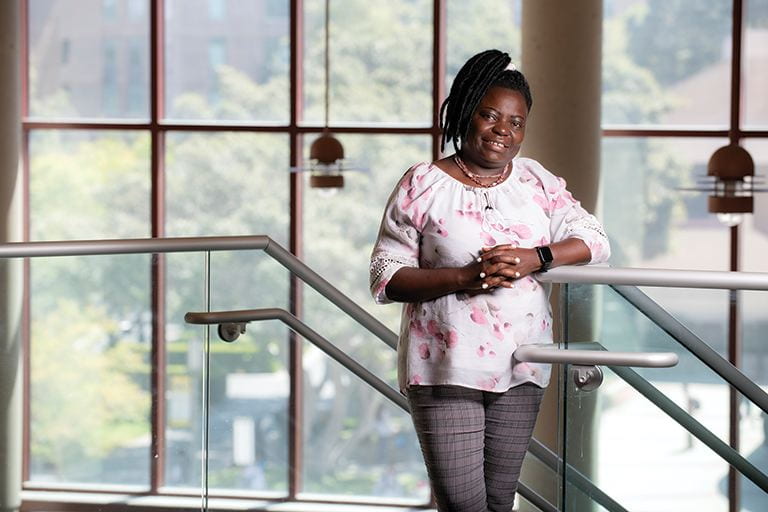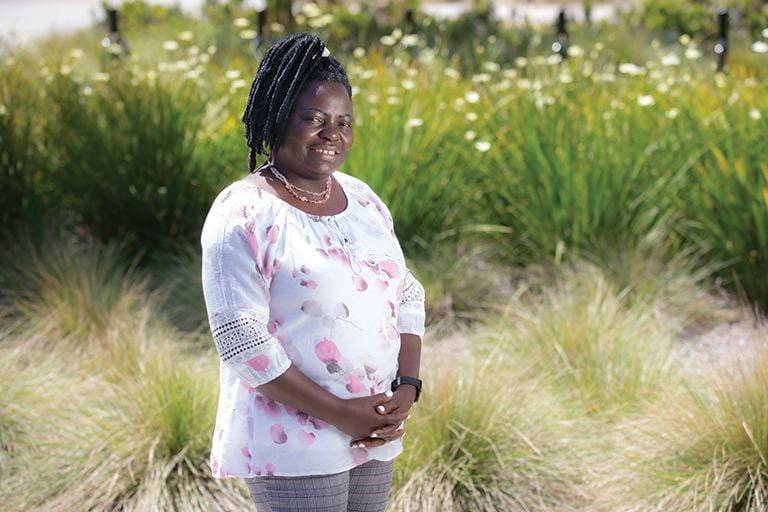Seeing the forest through the trees

Benis Egoh, UCI assistant professor of Earth system science.
To Benis Egoh, UCI assistant professor of Earth system science, a forest is not some abstract thing represented by the data and computer models she uses in studying arboreal ecosystems. When she was growing up in Cameroon, in equatorial Africa, a forest meant home.
It’s a place Egoh carried “in my heart” when she headed to college (B.S. in zoology, University of Uyo, Nigeria; M.S. in conservation biology, University of Cape Town, South Africa; Ph.D. in zoology, Stellenbosch University, South Africa) and then into the world at large, where she has helped formulate climate and sustainability plans for the European Commission and other organizations.
Egoh joined the UCI faculty in 2019 after, she says, “doing a lot of research on where to go. I was thrilled by the innovations in climate science by those here who are now my colleagues. And when I read about all the trees on campus [which now number over 30,000] and all the open space nearby, I decided UCI was the place to be.”
Her work today largely involves crafting policy proposals for a sustainable future – from California’s strained ecosystem to the environmentally challenging palm oil farms proliferating in Cameroon and many other developing nations. In February, Egoh received a Sloan Research Fellowship, awarded annually to early-career scholars with the potential to be the next generation’s scientific leaders – making her one of just 64 faculty members in UCI’s nearly 58-year history to earn this recognition.
She spoke with UCI Magazine contributor Jim Washburn in April shortly after returning from a trip to Cameroon, where she’s working on a documentary about sustainability.
How has your childhood influenced your work?
When I was growing up, the forest was right outside our door. It was part of our everyday life. My father worked for a banana and palm oil plantation, which was a mix of fields and forest. Much of our food came from the forest. When we got out of school every day, we’d go meet our parents in the fields, stopping on the way to pick and eat bananas and other fruits. My father also would put out box traps to attract animals that we’d use to make food.
So many of the things I learned I got direct from nature. The beauty and complexity of the forest fascinated me. That helped me years later when I did conservation planning. When you’re preserving nature, of course you look at the charismatic species, like the elephants and the lions, but there’s so much more, like the ants that carry out a lot of the ecological processes you don’t necessarily see. If you don’t conserve the small things, then you also lose the bigger things. My growing up surrounded with nature also made me very much interested in the part humans play in nature. These things are so close to my heart because this is how I was educated.

What are you currently working on?
My work now is focused on two things. One is looking at the impacts of climate change on humans and nature, using California as a study area. How do we model the changes? How do we measure the costs and benefits? For example, if we were to restore the forests in ways that help prevent fires, what is the benefit that we get from that forest, and who benefits? Will the benefits be sufficient to interest parties in getting money on the table for the restoration? Will the cost of restoration be offset by what’s saved on fighting fires? This is a small part of what we’re looking at.
The other work, which we are doing in Cameroon – including filming a documentary – is looking at how the trade in commodities like palm oil and cocoa impacts both nature and people.
They bring jobs and money to a community, but we must understand the effect on biodiversity and deforestation, as well as other issues such as the seizure of people’s land, child labor, the inequity of when people doing the labor aren’t paid enough to sustain or improve their lives, and factors such as fertilizer runoff ruining water supplies and the loss of carbon storage when forests are cleared.
We want to be able to show policymakers, businesses and farmers the monetary value of preserving forests, the resources they can sustainably get from forests, and the growing demand in the world for commodities that are sustainably produced.
My work is always based on using research to find solutions. Policymakers are often accused of making poor decisions, but sometimes they don’t have the information they need to make better ones. So my work is to present information to them as a tool they can use.
“When you’re preserving nature, of
course you look at the charismatic
species, like the elephants and the
lions, but there’s so much more, like
the ants that carry out a lot of the
ecological processes you don’t
necessarily see. If you don’t conserve
the small things, then you also lose
the bigger things.”
– Benis Egoh
Given the recent U.N. climate report and other grim environmental news, what keeps you working toward a better future?
I can see all the reasons why some choose the doom route. But you can also look at how much of the environmental loss we have slowed or stopped. There’s a lot of reforestation and restoration work going on. I’m very positive that we can balance it out somehow, but there’s a lot more that we need to do. Our science is not enough if we don’t take it out there and convince people with it. My biggest goal at UCI is to train our students so that they’ll continue with the work we do, not only as scientists but also as advocates for the environment. Maybe some of them will influence the policymakers and politicians of the future. Maybe some of them will be the policymakers. We have to keep finding solutions with our science and have to keep pushing and convincing. It’s a long fight, but I think there will be a future for us.
